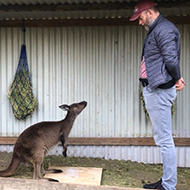
Study suggests marsupials interact with humans in a similar way to dogs.
Animals that aren't domesticated, such as kangaroos, can intentionally communicate with humans, according to new research.
The study by scientists in the UK and Australia found that kangaroos 'actively gaze' at humans when attempting to access food, as though they are asking them for help.
In the study, researchers tested kangaroos at three locations in Australia (Australian Reptile Park, Wildlife Sydney Zoo and Kangaroo Protection Co-Operative), by putting their food in a closed box. They found that, in a similar way to dogs, most of the kangaroos actively looked at the person who had put the food in the box to get it.
Previous research found that domesticated animals like dogs and goats can understand human cues, including pointing, to gather information about their environment.Scientists say this new study suggests that kangaroos may also be able to adapt their usual social behaviours for interacting with humans. Their findings are published in the journal Biology Letters.
Lead author Dr Alan McElligott from the University of Roehampton said: “Through this study, we were able to see that communication between animals can be learnt and that the behaviour of gazing at humans to access food is not related to domestication. Indeed, kangaroos - showed a very similar pattern of behaviour we have seen in dogs, horses and even goats when put to the same test.
“Our research shows that the potential for referential intentional communication towards humans by animals has been underestimated, which signals an exciting development in this area. Kangaroos are the first marsupials to be studied in this manner and the positive results should lead to more cognitive research beyond the usual domestic species.”
Co-author Dr Alexandra Green from the University of Sydney, said: “Kangaroos are iconic Australian endemic fauna, adored by many worldwide but also considered as a pest. We hope that this research draws attention to the cognitive abilities of kangaroos and helps foster more positive attitudes towards them.”



 The RCVS has announced a new version of its 1CPD mobile app, with enhanced features for veterinary surgeons and veterinary nurses to record their continuing professional development.
The RCVS has announced a new version of its 1CPD mobile app, with enhanced features for veterinary surgeons and veterinary nurses to record their continuing professional development.